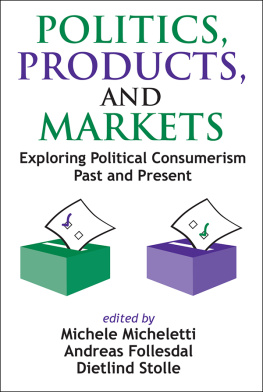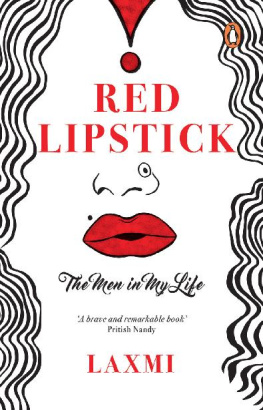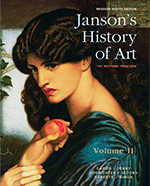Politics, Products and Markets
Politics, Products and Markets
Exploring Political Consumerism Past and Present
edited by
Michele Micheletti
Andreas Follesdal
Dietlind Stolle
First published 1971 by Transaction Publishers
Published 2017 by Routledge
2 Park Square, Milton Park, Abingdon, Oxon OX14 4RN
711 Third Avenue, New York, NY 10017, USA
Routledge is an imprint of the Taylor & Francis Group, an informa business
Copyright 2004 by Taylor & Francis.
All rights reserved. No part of this book may be reprinted or reproduced or utilised in any form or by any electronic, mechanical, or other means, now known or hereafter invented, including photocopying and recording, or in any information storage or retrieval system, without permission in writing from the publishers.
Notice:
Product or corporate names may be trademarks or registered trademarks, and are used only for identification and explanation without intent to infringe.
Library of Congress Number: 2003053135
Library of Congress Cataloging-in-Publication Data
Politics. products, and markets : exploring political consumerism past and present I Michele Micheletti, Andreas Follesdal, and Dietlind Stolle, editors.
p. cm.
Includes bibliographical references and index.
ISBN 978-1-4128-0552-0 (paper : alk. paper)
1. Politics, PracticalCongresses. 2. Political ethics Congresses. 3. Consumption (Economics) Political aspects Congresses. 4. Consumer behaviorMoral and ethical aspects Congresses. I. Micheletti, Michele. II. Follesdal, Andreas. III. Stolle, Dietlind, 1967-
JF799.P6395 2003
324dc2l
2003053135
ISBN 13: 978-1-4128-0552-0 (pbk)
ISBN 13: 978-0-7658-0200-2 (hbk)
Contents
Michele Micheletti
Michele Micheletti, Andreas Follesdal, and Dietlind Stolle
Andreas Follesdal
Paul Kennedy
Monroe Friedman
Cheryl Greenberg
David Vogel
W. Lance Bennett
Jonah Peretti (with Michele Micheletti)
Franck Cochoy
Andrew Jordan, Rdiger K. W. Wurzel, Anthony R. Zito, and Lars Brckner
Benjamin Cashore, Graeme Auld, and Deanna Newsom
Jrgen Goul Andersen and Mette Tobiasen
Bente Halkier
Michele Micheletti
Dietlind Stolle and Marc Hooghe
Andreas Follesdal, Michele Micheletti, and Dietlind Stolle
The book that you are about to read is the first general study of the phenomenon of political consumerism, the use of market action as an arena for politics, and consumer choice as a political tool. Its basis is conference papers for the International Seminar on Political Consumerism hosted by The City University of Stockholm, Sweden, in May-June 2001. A variety of themes were announced in the call for papers for the international seminar, which encouraged scholars to focus on an emerging theme in the social sciences that concerns the use of market action by individuals and institutions to create trust, control uncertainty, and solve common problems. In particular, I sought papers that discussed the ethical and global components of political consumerism as well as its historical roots and role in politics. Scholars investigating the institutional design of labeling schemes were approached specifically. During the four intense days of seminar discussion we penetrated the phenomenon of political consumerism normatively, theoretically, empirically, and historically. All in all we were twenty-five scholars representing eleven disciplines (political science, sociology, history, social psychology, business studies, communication, information technology, culture studies, history of ideas, philosophy, and policy studies) and eight countries (Denmark, France, Germany, Great Britain, India, Norway, Sweden, and the United States).
The cross-disciplinary and multicultural setting of the International Seminar on Political Consumerism proved to be ideal for the exchange of ideas on a common area of research. The papers on different countries and time periods and from different academic disciplines showed the breadth and richness of the phenomenon for scholarly research. Our historian colleagues reminded us that political consumerism is not a new phenomenon. Their good command of history urged all of us to consider and identify eventual differences between older and newer forms of political consumerism. Interestingly enough, the participants agreed generally on how political consumerism should be interpreted. We could unite on basic criteria for evaluating the relationship of political consumerism and democracy.
This volume includes heavily edited versions of fourteen papers presented at the international seminar. All contributions represent original research by scholars who have studied political consumerism in depth. The authors investigate different cases from history and contemporary times as well as discuss their theoretical and philosophical significance. They explain aspects of political consumerism, test hypotheses, understand it as a phenomenon, argue its normative aspects, point to its ethical shortcomings, and tell stories of its use. As such, the chapters employ the variety of scholarly approaches that are available for the study of political, economic, and social phenomena.
For me, the International Seminar on Political Consumerism as well as the editorship of this anthology together with two very competent social scientists, Andreas Follesdal and Dietlind Stolle, have been highly rewarding intellectual experiences. A network of political consumerist scholars has been established and joint research projects have evolved from our seminar discussions. I want to thank everyone who participated in the seminar for making it successful and enjoyable. The City University of Stockholm deserves special thanks for hosting and organizing the seminar, which was part of a large research program led by Emil Uddhammar, entitled Ethics, Virtues, and Social Capital in Sweden, and financed by Axel and Margaret Ax:son Johnsons Foundation. Two people at The City University in particular helped make the first International Seminar on Political Consumerism a pleasurable experience for all involved. They are Per Dahl and Agnes Svensson. I want also to thank Nils Karlson, president of The City University, for his help in completing this anthology according to plans and Kristina von Unge for editorial assistance.
Michele Micheletti
Stockholm
October 2002
Michele Micheletti, Andreas Follesdal, and Dietlind Stolle
The Market as a Site of Politics
Spectacular events such as the international boycott against South Africa, the campaign against Nestl, the student protest against Nike as well as the violent demonstrations in connection with meetings of the World Trade Organization and G-8 summit call our attention to the role of the global market as a site for ethics and citizen action as well as the phenomenon of political consumerism. Together with the loud protests surrounding international meetings and the quiet institutionalization of eco-labeling and forest stewardship certification, these examples show how citizens and institutions voice concern about the present global role of business. What is striking is how neo-liberal capitalism has triggered an economic globalization that heightens the influence of transnational corporations over our lives and our common future. Political consumerism acknowledges this new power of corporations and uses the market as a powerful site for politics. Political consumers respond to corporate policies and products as reflecting, expressing, and promoting political, social, and normative values beyond those of consumer price, taste, and quality of goods. This volume examines closely the roots and contemporary forms of the phenomenon of political consumerism.













